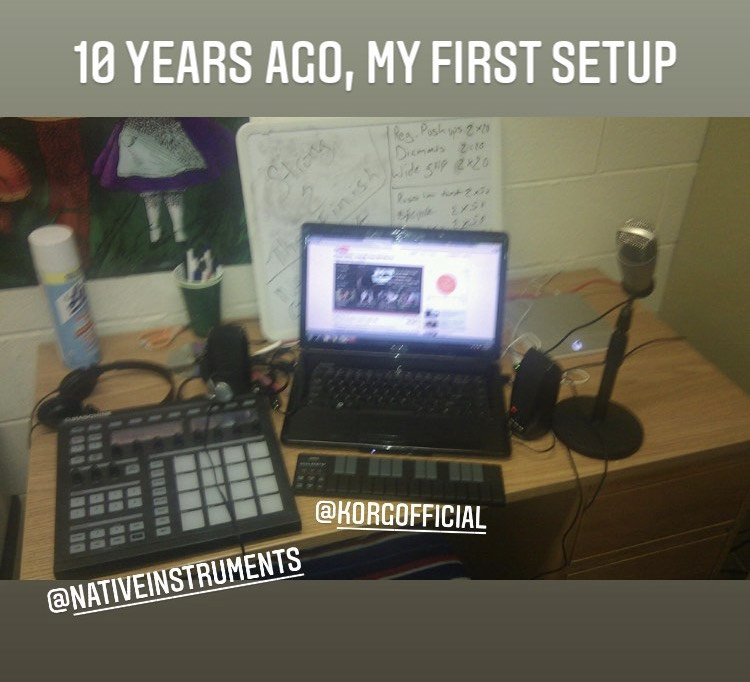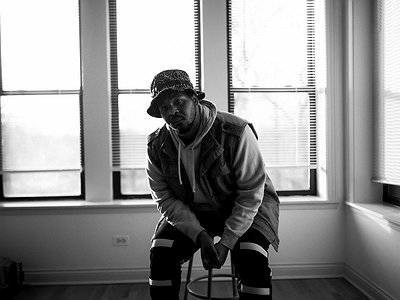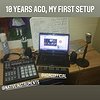Name: Darryl Bunch Jr. aka Heavee
Occupation: Producer
Nationality: American
Current release: Heavee's Audio Assault EP is out via Hyperdub.
Gear Recommendations: Pocket Operators for sure. Another win by TE. They're mostly under 100 dollars yet super capable and sound awesome, There’s a collection of them so you can have a little band when you put them together. I like to point people in this type of direction because accessibility means a lot to me, people from all walks of life should be able to reach this product.
Volca by Korg. Any of them is a game changer. I personally stand by the modular and FM. They are so capable and I never run out of joy playing with either of these synths. They are useful, affordable and will wow you everytime!
If you enjoyed this interview with Heavee and would like to explore his work in more depth, visit him on Facebook, and Soundcloud.
What was your first studio like?
This is a cool question! My first setup that I paid for myself, I actually have a picture because I was so proud. (laughs) But it was a Maschine mk1 that I bought with bookstore money (should have been buying books for class lmfao), a Korg nano key keyboard and a Behringer cl-1 microphone. 
Extremely basic, but I've always loved the Native Instruments workflow and felt right at home making beats in my dorm room with it.
How and for what reasons has your set-up evolved over the years and what are currently some of the most important pieces of gear for you?
I've always been hungry to upgrade and have a huge and powerful studio setup one day, a spaceship if you will.
Over the last few years I found that I can be hard on computers or maybe I’m not buying powerful enough machines. I’ve always felt limited or held back by CPU power or wear and tear. This, paired with my introduction to the “DAWless” community in 2018, sparked a new wave of urgency to move away from the computer as much as possible and focus on discrete components that may just do one thing extremely well: Groove boxes, analog and digital synthesizers, portable workstations, mixers and digital recorders.
Over the years I’ve added things, got rid of stuff, switched to the Akai MPC series in place of maschine, although I still use the software from time to time and click stuff in. (laughs)
I have some new favorites like the Op-1 and Volca FM, — the FM is really slept on and powerful in my opinion. I can get sounds I would never be able to imagine from it. It’s a perfect companion to any sampler or drum machine. Some pieces that have become important would be my phone for Koala sampler. I honestly couldn’t live without this crazy app. It’s a low pressure way to collect samples and have fun recording the sounds of your environment or jamming with friends.
Teenage engineering’s Op-z is another one of my favorite portable workstations that's super important to me these days. It's capable of so much, I pull up to a session and I can jam with people. All I need is a line in and we can get into a groove.
The digital studio promises endless possibilities at every step of the process. What is it that you actually need from these potentials and how do you go about selecting it? How do you keep control over the wealth of options at the production stage?
Lmao thee ol’ analysis paralysis … decision fatigue — it’s real in the box I’ll say for sure.
I spent time over the years with the same DAW and going beyond making tracks. I like going through settings, checking and looking up options and things I wouldn’t normally touch. Making sure I get comfortable with it all.
So I caught on to the favorites folders where you can set up your DAW to highlight your essentials that can be recalled easily. Not just static samples, but complex routed chains, synth presets from other songs, etc. This puts me at the advantage of being able to deliver in a crunch or high pressure studio session.
A studio can be as minimal as a laptop with headphones and as expansive as a multi-room recording facility. Which studio situation do you personally prefer – and why?
I’ve been making music in my room with my laptop for 10+ years and can honestly say I’ve been to an official studio for my music less than 5 times in my career. Gimme the big room with the best microphones and outboard gear you’ve got!
I can appreciate both sides, you know, I’ve done my time looking up all the great outboard components and how they work, watching masters like Sylvia Massey and Dave Pensado videos to soak up as much game as I could so I wouldn’t mess anything up. (laughs)
From traditional keyboards to microtonal ones, from re-configured instruments (like drums or guitars) to customized devices, what are your preferred controllers and interfaces? What role does the tactile element play in your production process?
I’ve always been a fanatic about programming drums with human feel. So from Maschine as my first drum machine to now using the MPC live 2, I’ve always needed those 16 drum pads to tell my story in a kinetic way. I’m seeing interesting devices come out very often these days like the FX babies from Moon Armada - external effects That I’m planning on getting. I’m intrigued by anything that can lead me to a new sound.
My preference of interface didn't matter as much but now if I can I like to have my UA twin in sessions. It’s an extension of me in my workflow. There’s ease in being able to talk back to my vocalist or switching between digital preamps or chains with one button.
How would you describe the relationship between technology and creativity for your work? Using a recent piece as an example, how do you work with your production tools to achieve specific artistic results?
I consider myself to be tethered to my studio. Amongst wires and midi cables I’m in constant contact with my machines during programming punching in just about every single note with my fingers.
For example, "Floor burn" started on a whim at work.
I was watching a classic movie, House party, when I decided to look up songs from that era, landing on “Do this my way” by Kid and Play. I chased the acapella down and saved that for later, and started playing around with soft synth one shots I made and saved to iCloud on Koala for the intro. I came up with the AAH loop and sent those stems to Ableton along with the acapella and began connecting the dots. It didn't take long with Subtractive arrangement in mind, I would build up as much as I could take and then strip it all away ... I really enjoyed that vocal bit, it was perfect for footwork.
Within a digital working environment, it is possible to compile huge archives of ideas for later use. Tell me a bit about your strategies of building such an archive and how you put these ideas and sketches to use.
My latest unfinished album effort is about 80% done and it’s one of my favorites for this reason.
The project started with sound design as the beginning; sculpting my own drum kit was the first piece to the puzzle. I wanted a brand new sound, I explored modal, physical modeling, FM, slapstick, and a few other forms of synthesis to help me understand concepts like tension and release, impact and resonance in new ways. Each time I would go and make a small batch of sounds like a testament to picking up something new with each lesson.
Sourcing your own collection of field recordings is the next element that goes into a more organic, unique approach to music making. I got into foley, spending a lot of time on YouTube at work. I got gems from some of those videos, like capturing the world around you and putting it into your music can be fun and help tell a story.
I started sampling my everyday life at that point for a while. I didn’t go out and get a zoom H4n pro off the bat. I started with my iPhone and worked up to it. I was already very familiar with the voice memo app, it’s seen major updates and it was easy to add as a part of my workflow.
But I say all that to say I intended to explore the field recordings as wavetables through soft synths like vital or serum. You begin to hear one of a kind tones with irregularities. Real unique stuff.
Or you can just push them through your own wacky a** fx chains. During drum synthesis I played around with a heavily saturated chain with an often out of phase chorus-y type of sound. This is how I found myself in a new world.
Despite the aforementioned near endless possibilities, many productions seem to follow conventional paths. How do you retain an element of surprise for your own work – are there technologies which are particularly useful in this regard?
I swear by a few devices that help me stick out and stay inspired.
Oftentimes music communities like the one I've come from do a great deal of sound sharing, and while that really does help one get an understanding of what's possible with a specific set of sounds, it can run its course quickly and feel claustrophobic. So I wanted to go out and get hardware synths that can help me create one of a kind sounds from building new presets and not sharing everything I come across. (laughs)
Production tools can already suggest compositional ideas on their own. How much of your music is based on concepts and ideas you had before entering the studio, how much of it is triggered by equipment, software and apps?
If I had to put a number to it, I’d say 35 percent of it tends to land on computer generated chord progressions or arpeggiations. I do a lot of programming so we can work together to create the composition and I humanize it along the way.
How important is it for you that you personally create or participate in the creation of every element of a piece – from sound synthesis via rhythm programming to mixing?
For my latest release with hyperdub I wanted to control the narrative as best I could by making every component from scratch within my limits in conjunction with supporting the Chicago footwork drum sample set that I typically use very frequently in my music. Similar to the “Ha crash” in Vogue / Ballroom, or “trigga Man sound” from New Orleans bounce, I use the drum kit passed down to me in the same right and regard with respect and utmost care.
Beyond that, everything else would need to be sourced, synthesized, or created by me.
The project started off with field recordings I personally sourced from downtown Chicago; for example — I walked down a busy street just leaving work. The time of day was just before sunset. The sky was a beautiful gradient of shades ranging from orange to purple, I heard the crickets singing and cars zooming by as I walked past the Jesse white tumbling team gym and they was so loud and unique that I had to capture it. It had a triplet rhythm to it almost, so I took that home and built an environment around it with synths that felt hazy and tense.
Sonic warfare came out as a result — a beginning to “weaponizing music” or skillfully manipulating sound to build worlds, environments.
Have there been technologies which have profoundly changed or even questioned the way you make music?
There’s been a few times in my career where I’ve felt this feeling.
I’d say being introduced to the subpac was pretty life changing for me. I don’t own one, but have spent extensive time with it alongside plenty of conversations with the manufacturing team about it and there’s nothing like it. A backpack that gives you an accurate readout of your bass in sonic vibrations that help you FEEL your song. It’s eye opening to see what to expect before hitting the dance floor. Changed my life getting to feel my songs in a brand new way.
To some, the advent of AI and 'intelligent' composing tools offers potential for machines to contribute to the creative process. Do you feel as though technology can develop a form of creativity itself? Is there possibly a sense of co-authorship between yourself and your tools?
When I set up an instrument with automation on multiple levels and send midi through it, it takes on a brand new form and begins to “breathe”. That’s been a thing for me lately that I’m really inspired to try in almost every session nowadays— just thinking of ways to make my synth lines more exciting and in constant motion.
Do you personally see a potential for deeper forms of Artificial Intelligence in your music?
Always open to exploring the tools of the future. Would love to research more generative methods. I run to technology and embrace it because I usually find myself really appreciating the problem solving aspects of new equipment and software. So I’m very much so into the idea of deeper AI connections. I'm in the future music wise!
What tools/instruments do you feel could have a deeper impact on creativity but need to still be invented or developed?
There’s a company that developed a microphone that converts audio to midi (vochlea doubler). I'm dying to try it out. I’ve been an avid beatboxer for my whole life and would love to implement those grooves and rhythms from my beatboxing. I think it’s still pretty early in its stages … it’s been out for a while but honestly it’s a new product and a new company — so personally, I’d wait for version 2 or a big firmware update before I grab one.
Also I would like to see a mobile app from music DAW software companies that allow us to listen to unfinished projects in their current state and add notes and share files. Help us collaborate and stay working efficiently.





